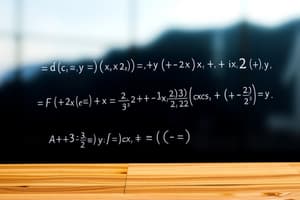Podcast
Questions and Answers
What is the relationship between $\lim_{x \to c} f(x)$ and $f(c)$ when the limit exists?
What is the relationship between $\lim_{x \to c} f(x)$ and $f(c)$ when the limit exists?
- $\lim_{x \to c} f(x) \geq f(c)$
- $\lim_{x \to c} f(x) \neq f(c)$
- $\lim_{x \to c} f(x) = f(c)$ (correct)
- $\lim_{x \to c} f(x) > f(c)$
Which theorem is applied first to solve the expression $\lim_{x \to 0} (2x^3 + 4x^2 - 1)$?
Which theorem is applied first to solve the expression $\lim_{x \to 0} (2x^3 + 4x^2 - 1)$?
- Multiplication
- Division
- Addition (correct)
- Constant Multiple
What is the appropriate term to divide the expression $\lim_{x \to \infty} \frac{9x^2}{x^2 - 1}$?
What is the appropriate term to divide the expression $\lim_{x \to \infty} \frac{9x^2}{x^2 - 1}$?
- $x^2$ (correct)
- $x^4$
- $x^3$
- $x$
What is the computed value of A when evaluating $\lim_{x \to \infty} \frac{x}{x}$ for the given points?
What is the computed value of A when evaluating $\lim_{x \to \infty} \frac{x}{x}$ for the given points?
What characteristic does a function exhibit if its graph can be traced without lifting the pen when approaching a specific x-value?
What characteristic does a function exhibit if its graph can be traced without lifting the pen when approaching a specific x-value?
What does it imply if $\lim_{x \to c} f(x) \neq f(c)$?
What does it imply if $\lim_{x \to c} f(x) \neq f(c)$?
Which operation must be used first to evaluate $\lim_{x \to 0} (4x^2)$?
Which operation must be used first to evaluate $\lim_{x \to 0} (4x^2)$?
What can be inferred about the value of a function if as x approaches a large value, f(x) approaches a constant?
What can be inferred about the value of a function if as x approaches a large value, f(x) approaches a constant?
What is the value of 𝑓(𝑐) at 𝑥 = 0 using the function $f(x) = \frac{3x^2 + x - 2}{x - 1}$?
What is the value of 𝑓(𝑐) at 𝑥 = 0 using the function $f(x) = \frac{3x^2 + x - 2}{x - 1}$?
In which interval is the function $k(x) = { x^2 + 1, \text{ if } 0 \leq x \leq 1 } \text{ and } { \frac{2}{x}, \text{ if } x > 1 }$ continuous?
In which interval is the function $k(x) = { x^2 + 1, \text{ if } 0 \leq x \leq 1 } \text{ and } { \frac{2}{x}, \text{ if } x > 1 }$ continuous?
In the Intermediate Value Theorem (IVT), where should the value of m fall?
In the Intermediate Value Theorem (IVT), where should the value of m fall?
Which of the following is NOT a notation for the derivative of 𝑓 if 𝑦 = 𝑓(𝑥)?
Which of the following is NOT a notation for the derivative of 𝑓 if 𝑦 = 𝑓(𝑥)?
Which statement regarding continuity of a function is correct?
Which statement regarding continuity of a function is correct?
Which of the following represents the constant multiple rule?
Which of the following represents the constant multiple rule?
According to the Extreme Value Theorem, what must be fulfilled first?
According to the Extreme Value Theorem, what must be fulfilled first?
What kind of rule can be used to solve the derivative of 𝑓(𝑥) = (4𝑥 − 1)⁴ easily?
What kind of rule can be used to solve the derivative of 𝑓(𝑥) = (4𝑥 − 1)⁴ easily?
Which function is to be solved first in determining the derivative of 𝑗(𝑥) = sin⁴(2𝑥 + 1)?
Which function is to be solved first in determining the derivative of 𝑗(𝑥) = sin⁴(2𝑥 + 1)?
Utilizing implicit differentiation, which of the following is the derivative of 𝑦² = 4𝑥?
Utilizing implicit differentiation, which of the following is the derivative of 𝑦² = 4𝑥?
What is the limit of the polynomial function if 𝑓(𝑐) = −12 and lim 𝑥→𝑐 𝑓(𝑥) = 𝑓(𝑐)?
What is the limit of the polynomial function if 𝑓(𝑐) = −12 and lim 𝑥→𝑐 𝑓(𝑥) = 𝑓(𝑐)?
What is the value of the expression lim (2𝑥³ + 4𝑥² − 1) as 𝑥 approaches 0?
What is the value of the expression lim (2𝑥³ + 4𝑥² − 1) as 𝑥 approaches 0?
What is the value of the expression lim 1/𝑥 as 𝑥 approaches infinity?
What is the value of the expression lim 1/𝑥 as 𝑥 approaches infinity?
What would be the correct statement about the continuity of 𝑓(𝑥) at 𝑥 = 0 after applying the third condition of continuity?
What would be the correct statement about the continuity of 𝑓(𝑥) at 𝑥 = 0 after applying the third condition of continuity?
What is the slope of the tangent line of the graph of 𝑓(𝑥) = 𝑥² at point (2, 4) where 𝑥₀ = 2?
What is the slope of the tangent line of the graph of 𝑓(𝑥) = 𝑥² at point (2, 4) where 𝑥₀ = 2?
What is the derivative of 𝑔(𝑥) = 2𝑥(𝑥 + 1)?
What is the derivative of 𝑔(𝑥) = 2𝑥(𝑥 + 1)?
What is the derivative of the function 𝑓(𝑥) = (4𝑥 − 1)⁴?
What is the derivative of the function 𝑓(𝑥) = (4𝑥 − 1)⁴?
Using implicit differentiation, what is the derivative of the equation 3𝑥² + 4𝑦² = 11?
Using implicit differentiation, what is the derivative of the equation 3𝑥² + 4𝑦² = 11?
What is the objective function for making an open-top rectangular box from a 24 cm by 9 cm cardboard?
What is the objective function for making an open-top rectangular box from a 24 cm by 9 cm cardboard?
What is the volume of the open-type box created from the cardboard?
What is the volume of the open-type box created from the cardboard?
What is the resulting form of the equation sin(cos(𝑥𝑦)) = 3 after integration?
What is the resulting form of the equation sin(cos(𝑥𝑦)) = 3 after integration?
Which of the following is the derivative of 𝑒^(4𝑦) = 5𝑥³ − 9𝑥?
Which of the following is the derivative of 𝑒^(4𝑦) = 5𝑥³ − 9𝑥?
Which of the following expresses the relationship between the area of a ripple and the radius of the ripple?
Which of the following expresses the relationship between the area of a ripple and the radius of the ripple?
Flashcards
Limit Definition
Limit Definition
The limit of f(x) as x approaches c is the value f(c) that f(x) approaches.
Limit Relationship
Limit Relationship
If lim as x→c f(x) = f(c), the function is continuous at c.
Limit Theorems
Limit Theorems
Basic theorems include Addition, Constant Multiple, and others for evaluating limits.
Dividing Limits
Dividing Limits
Signup and view all the flashcards
Limit at Infinity
Limit at Infinity
Signup and view all the flashcards
Continuous Function
Continuous Function
Signup and view all the flashcards
Graph Approaching Values
Graph Approaching Values
Signup and view all the flashcards
Limit Values Table
Limit Values Table
Signup and view all the flashcards
Continuity at a point
Continuity at a point
Signup and view all the flashcards
Interval of continuity
Interval of continuity
Signup and view all the flashcards
Intermediate Value Theorem (IVT)
Intermediate Value Theorem (IVT)
Signup and view all the flashcards
Derivative notation
Derivative notation
Signup and view all the flashcards
Extreme Value Theorem
Extreme Value Theorem
Signup and view all the flashcards
Constant multiple rule
Constant multiple rule
Signup and view all the flashcards
Conditions of continuity
Conditions of continuity
Signup and view all the flashcards
Function continuity everywhere
Function continuity everywhere
Signup and view all the flashcards
Chain Rule
Chain Rule
Signup and view all the flashcards
Trigonometric Function
Trigonometric Function
Signup and view all the flashcards
Implicit Differentiation
Implicit Differentiation
Signup and view all the flashcards
Limit of a Polynomial
Limit of a Polynomial
Signup and view all the flashcards
Limit as x approaches infinity
Limit as x approaches infinity
Signup and view all the flashcards
Third Condition of Continuity
Third Condition of Continuity
Signup and view all the flashcards
Slope of Tangent Line
Slope of Tangent Line
Signup and view all the flashcards
Derivative at a Point
Derivative at a Point
Signup and view all the flashcards
Derivative of g(x)
Derivative of g(x)
Signup and view all the flashcards
Derivative of f(x)
Derivative of f(x)
Signup and view all the flashcards
Implicit differentiation result
Implicit differentiation result
Signup and view all the flashcards
Objective function for box
Objective function for box
Signup and view all the flashcards
Volume of the box
Volume of the box
Signup and view all the flashcards
Area growth of ripples
Area growth of ripples
Signup and view all the flashcards
Derivative of e^(4y)
Derivative of e^(4y)
Signup and view all the flashcards
Rate of area change
Rate of area change
Signup and view all the flashcards
Study Notes
Basic Calculus - Third Quarterly Post Test
- Multiple Choice Questions: The test covers various calculus concepts.
- Relationship between limit and function value: The limit of a function as x approaches c equals the function value at c (lim f(x) = f(c)).
- Theorems for solving limits: Various theorems such as constant multiple, addition, division, and multiplication properties are used to evaluate limits.
- Limits and expressions: Questions involve finding limits of algebraic expressions.
- Continuity: The test questions included a problem involving the first condition of continuity, concerning a function's value at a point. The function must be defined there, and the limit from the left and right must be equal to the function value to ensure continuity.
- Continuity of Functions: The test assesses the understanding of function continuity. One example involves identifying the intervals where a piecewise-defined function is continuous.
- Derivative Notation: Different notations for the derivative of a function are considered (e.g., f'(x), dy/dx).
- Rules for differentiation: Understanding various differentiation techniques will help in answering questions.
- Extreme Value Theorem: The Extreme Value Theorem states that a continuous function on a closed interval must attain both a maximum and a minimum value on that interval.
- Implicit Differentiation: Some questions include implicit differentiation, where relationships among variables are defined implicitly, and the derivatives are found by differentiating implicitly.
- Trigonometric Functions and their derivatives: Questions about the derivative of trigonometric functions, or functions composed of trigonometric functions, show up in this test.
- Area, Radius, and Time: Questions concerning the rate of change of area and radius of circles involve calculating the derivative of the area formula (Area = πr²) with regards to time.
Studying That Suits You
Use AI to generate personalized quizzes and flashcards to suit your learning preferences.




